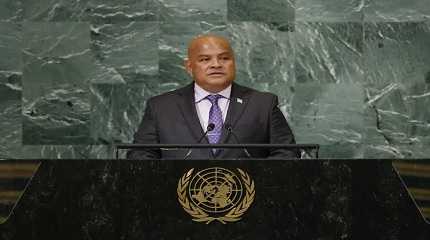
WELLINGTON, New Zealand (AP) — Micronesia’s president accused China of “political warfare” in a letter to other national leaders and discussed switching diplomatic allegiance from China to Taiwan in exchange for $50 million.
President David Panuelo said China had been using nefarious tactics, including spying and offering bribes, in an effort to ensure that if it goes to war with Taiwan, Micronesia would be aligned with China rather than the United States, or would at least abstain from taking sides.
Panuelo sent the 13-page letter dated March 9, which was obtained by The Associated Press, to state governors and other political leaders of the Pacific nation.
The letter represented an unusually frank assessment of China’s motives in the region and laid bare the financial incentives for smaller countries to switch diplomatic allegiance.
Should Micronesia switch allegiance to Taiwan, it would represent a rare win for the self-governing island, after several Pacific nations switched allegiance from Taiwan to China in recent years.
“I believe that our values are presently being used against us” Panuelo wrote in his letter. “One of the reasons that China’s political warfare is successful in so many arenas is that we are bribed to be complicit, bribed to be silent.”
He gave examples, saying that when the vice president was a senator, he was asked by China’s ambassador to accept an envelope filled with money, which he refused.
China denied the allegations.
“We noted relevant reports, in which the smear and accusations against China are completely inconsistent with the facts,” Chinese Foreign Ministry spokesperson Mao Ning said at a daily briefing Friday.
“We’ve always respected Micronesia’s development path that it has chosen in light of its own national conditions and have supported the Micronesian side in safeguarding independence,” Mao said.
Panuelo gave other examples of what he called China’s “grey zone” activities. He said that Chinese research vessels had been operating inside Micronesia’s ocean territory to spy, by mapping potential resources and submarine travel paths.
He said that when he traveled to Fiji in July to attend the Pacific Islands Forum, he was followed around by two Chinese men, who Micronesia discovered worked for the Chinese Embassy in Fiji and included an intelligence officer.
“To be clear: I have had direct threats against my personal safety from PRC (People’s Republic of China) officials acting in an official capacity,” Panuelo wrote.
He said that in February, he met with Taiwan’s Foreign Minister Joseph Wu and told him that Micronesia would need money for its trust fund if it was to switch diplomatic allegiance.
“I was transparent with Foreign Minister Wu; we project we need an injection of approximately $50 million to meet our future needs,” Panuelo wrote. “We can and will receive this, over a three-year period, if and when we establish diplomatic relations with Taiwan.”
He said Micronesia would also receive an annual $15 million assistance package and Taiwan would take over various projects that China had begun, including a national convention center, two state government complexes, and two gyms.
Panuelo concluded by saying he loved Micronesia too much not to inform them of the kinds of threats and opportunities the country faced, even if writing the letter put himself, his family and his staff at risk.




